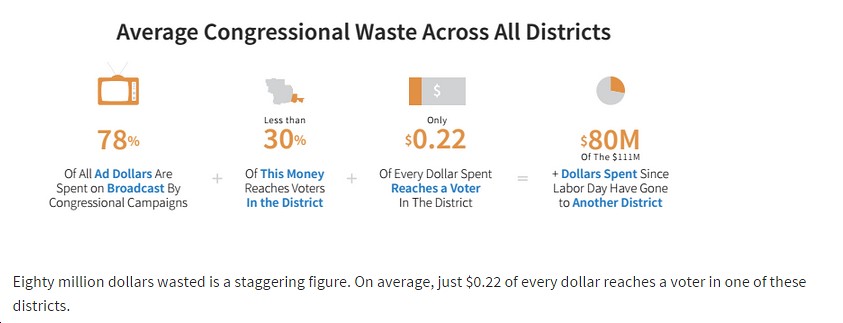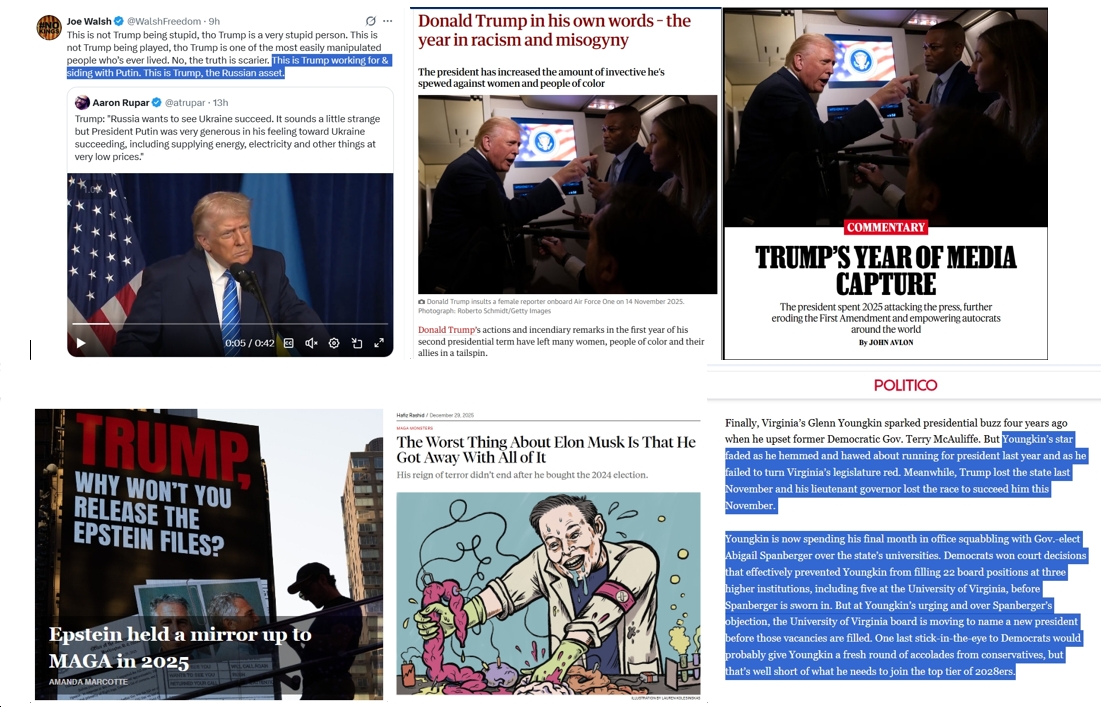I’ve said for years that broadcast TV advertising, particularly in places like the expensive and fragmented DC Metro market, provide an extremely low “bang for the buck”/”return on investment” to Congressional candidates. Now we have some new numbers which illustrate my point: “More than $111 million has been spent on broadcast television ads for U.S. House candidates since Labor Day, but more than $80 million of that went to ads airing outside the candidates’ districts, according to data by Targeted Victory” (see Targeted Victory’s analysis here). Yep, $80 million out of $111 million outright wasted. That’s a pathetically low “bang for the buck” by almost any metric. But wait, it gets worse!

Take Virginia’s 10th CD for instance. If you run broadcast TV ads in the DC Metro market, it costs a fortune, but what percentage reach: a) areas outside the 10th CD; b) people in the 10th CD who aren’t likely voters? As for part a of this question, that’s easy. See this Designated Market Map for the DC area: in short, your broadcast TV ad will reach the eastern panhandle of West Virginia (not in the 10th CD), large swaths of Maryland (not in the 10th CD), DC (not in the 10th CD), Arlington (ditto), Alexandria (ditto), Fairfax County (mostly ditto), Prince William County (ditto), Stafford/Spotsylvania/etc. (ditto). All that money is TOTALLY WASTED. In the end, perhaps 1/7th (14%) or so of market reached by a broadcast TV ad in the DC Metro market reaches the 10th CD. That means 86% of a DC Metro market broadcast TV ad buy is essentially “bleed” — not reaching the targeted audience at all, ergo wasted.
Within the 10th CD, it’s important to point out that most people reached by a broadcast TV ad in a mid-term election like this will not be likely voters, let alone what you really want: likely AND persuadable voters in the district. The number of those people reached by your (super-expensive) ad? Miniscule. Bang for the buck? Less than miniscule. Of course, the ad also reached UNlikely voters who might be persuaded to vote, and I’m told that broadcast TV ads do “move the numbers,” but I haven’t seen any serious, controlled, scientific studies comparing: a) effectiveness of broadcast TV advertising in “moving the numbers” and b) effectiveness of other advertising techniques – radio, direct mail, print, social media/digital, etc. – in “moving the numbers.”
Anyway, just for fun, let’s say the 10th CD makes up 14% of the DC-area media market. Then, let’s assume 40% turnout of registered voters — or to put it another way, maybe 25% of the total district population. Then, let’s consider what percentage of that 25% are truly persuadable — 10%-20% perhaps? Multiply these numbers together and you end up spending a huge amount of money on TV to reach…what? Again, in fairness, those ads also will reach voters who might not even have known there was an election, or didn’t know anything about the candidates, or might not have been intending to vote but decided to after being barraged by TV ads. That’s hard to measure, but it certainly could increase the value of the broadcast TV ads. The question, by how much?
Anyway, the big question is why campaigns keep returning to the expensive, non-targeted broadcast TV advertising “well?” The question “cui bono” — “to whose benefit?” ) comes to mind. Think about it: who benefits from this huge expenditure of money? Obviously, it’s: a) the people who make and buy these ads; and b) the TV stations that are paid handsome sums to run them. The question is, does the candidate benefit, especially when one considers “opportunity cost” – could that money have been spent more efficiently, effecitvely, etc? I’m skeptical.
The sad reality, of course, is that there’s a ton of money sloshing around out there, looking for a home, in the campaign-advertising-industrial complex. Those people, with their strongly vested interest in seeing that money spent, are highly motivated to convince actual and potential candidates that their services are invaluable, that if the candidate only does what they the consultants tell the candidate to do, he/she can WIN WIN WIN! (getting excited yet? heh) And time and again, it works. Plus, of course, if campaign managers simply follow the script that “everyone” follows, it’s “safe” in the sense that if they lose, they can say they did what everyone said they should do. In short, it’s a great CYA move to follow the cookie-cutter model towards campaign management: raise a ton of money, save it up until the end, run scads of broadcast TV ads.
Is there an alternative to this model? In theory, of course there is. For instance, how about having the candidate, instead of spending all their time raising and spending money, do…other stuff? Yes, I realize it’s tough, given the absence of earned media, the collapse of newspaper coverage, etc. But theoretically, they COULD shift their resources to field and social/digital media, targeted radio and in-district cable TV, niche publications (e.g., Korean/Spanish/etc. language newspapers and radio stations), print advertising in local papers, stuff like that. That would be much less expensive, but would also be a gazillion times more focused locally, within the district, reducing the absurd “bleed” that’s inherent to broadcast TV advertising. As an added bonus, the candidate wouldn’t have to spend 8 hours a day or whatever on miserable “call time,” and could instead be out knocking doors, attending community events/festivals, doing interviews, studying up on policy issues and working on their presentation skills so they can kick butt in debates and other public forums, etc, etc.
Again, though, there’s a huge class of consultants out there who don’t get paid if the above model takes hold. Which is why they’ll tell you it’s crazy to change, that of COURSE you need broadcast TV ads, blah blah blah. Just one thing: when you’re considering whether or not you should believe these consultants, just keep one thing in mind that they have a super-strong vested financial/economic interest in persuading everyone that they’re right. So take their advice with the appropriately-sized grain (pillar?) of salt.



![Sunday News: “Trump Is Briefed on Options for Striking Iran as Protests Continue”; “Trump and Vance Are Fanning the Flames. Again”; “Shooting death of [Renee Good] matters to all of us”; “Fascism or freedom? The choice is yours”](https://bluevirginia.us/wp-content/uploads/2026/01/montage011126.jpg)

![Thursday News: “Europe draws red line on Greenland after a year of trying to pacify Trump”; “ICE Agent Kills Woman, DHS Tells Obvious, Insane Lies About It”; “Trump’s DOJ sued Virginia. Our attorney general surrendered”; “Political domino effect hits Alexandria as Sen. Ebbin [to resign] to join Spanberger administration”](https://bluevirginia.us/wp-content/uploads/2026/01/montage010826.jpg)












